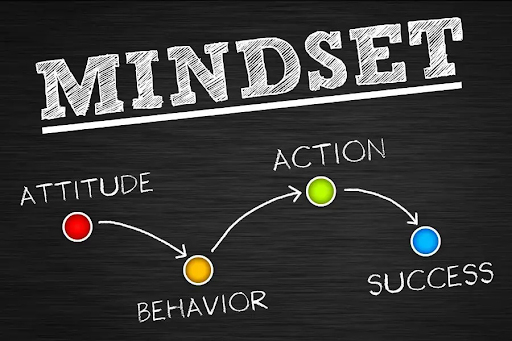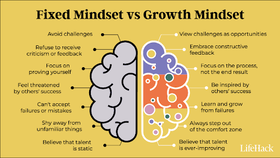Your mindset is a set of beliefs that shape how you make sense of the world and yourself. It influences how you think, feel, and behave in any given situation. It means that what you believe about yourself impacts your success or failure.
According to Stanford psychologist Carol Dweck, your beliefs play a pivotal role in what you want and whether you achieve it.1 Dweck has found that it is your mindset that plays a significant role in determining achievement and success.
Mindsets can influence how people behave in a wide range of situations in life. For example, as people encounter different situations, their mind triggers a specific mindset that then directly impacts their behavior in that situation.
Fixed vs. Growth Mindsets
According to Dweck, there are two basic mindsets: fixed and growth. If you have a fixed mindset, you believe your abilities are fixed traits and therefore can't be changed. You may also believe that your talent and intelligence alone lead to success, and effort is not required.
On the flip side, if you have a growth mindset, you believe that your talents and abilities can be developed over time through effort and persistence. People with this mindset don't necessarily believe that everyone can become Einstein or Mozart just because they try. They do, however, believe that everyone can get smarter or more talented if they work at it.
Here are some fixed vs. growth mindset examples.
|
Fixed Mindset |
Growth Mindset |
|
Either I’m good at it or I’m not. |
I can learn to do anything I want. |
|
That's just who I am. I can't change it. |
I'm a constantly evolving work in progress. |
|
If you have to work hard, you don't have the ability. |
The more you challenge yourself, the smarter you become. |
|
If I don’t try, then I won’t fail. |
I only fail when I stop trying. |
|
That job position is totally out of my league. |
That job position looks challenging. Let me apply for it. |
The Impact of Mindset
Your mindset plays a critical role in how you cope with life's challenges. When a child has a growth mindset, they tend to have a hunger for learning and a desire to work hard and discover new things. This often translates into academic achievement.
As adults, these same people are more likely to persevere in the face of setbacks. Instead of throwing in the towel, adults with a growth mindset view it as an opportunity to learn and grow. On the other hand, those with fixed mindsets are more likely to give up in the face of challenging circumstances.
In her book "Mindset: The New Psychology of Success," Dweck writes that those with fixed mindsets are constantly seeking the validation to prove their worth not just to others, but also to themselves.
"I've seen so many people with this one consuming goal of proving themselves in the classroom, in their careers, and in their relationships. Every situation calls for a confirmation of their intelligence, personality, or character. Every situation is evaluated: Will I succeed or fail? Will I look smart or dumb? Will I be accepted or rejected? Will I feel like a winner or a loser?
— CAROL DWECK
How to Unfix a Fixed Mindset
While people with a fixed mindset might not agree, Dweck suggests that people are capable of changing their mindsets. Here's how.
- Focus on the journey. An important factor when building a growth mindset is seeing the value in your journey. When you're fixated on the end result, you miss out on all the things you could be learning along the way.
- Incorporate "yet." If you're struggling with a task, remind yourself that you just haven’t mastered it “yet.” Integrating this word into your vocabulary signals that despite any struggles, you can overcome anything.
- Pay attention to your words and thoughts. Replace negative thoughts with more positive ones to build a growth mindset.
Take on challenges. Making mistakes is one of the best ways to learn. So, instead of shying away from challenges, embrace them.


